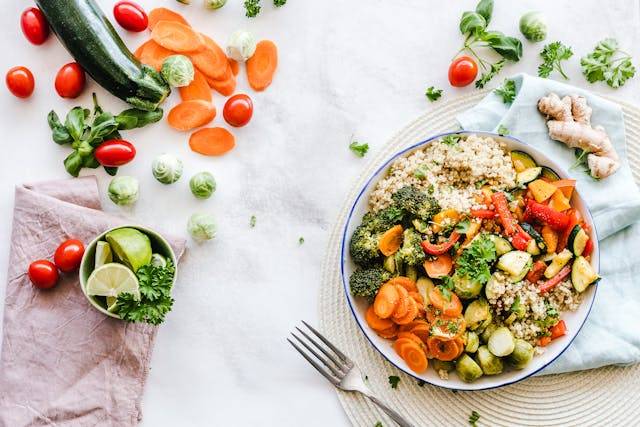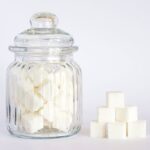Introduction: Why Gut Health Is the Foundation of Overall Wellness
Have you ever had a “gut feeling” about something? That’s not just a figure of speech—it turns out your gut and brain are more connected than we ever imagined. Your digestive system is home to trillions of bacteria, known as the gut microbiome, and it’s one of the most critical components of your health.
From boosting immunity and balancing hormones to reducing inflammation and improving mood, your gut affects nearly every aspect of your body. So, how can you take care of it without diving into complicated diets or expensive supplements? The answer is simple: through food.
In this post, we’ll break down the importance of gut health and share easy, everyday foods that support a healthy gut from the inside out.
What Exactly Is Gut Health?
Your “gut” includes your stomach, small and large intestines, and everything in between. It’s responsible for digesting food, absorbing nutrients, and eliminating waste. But more than that, your gut is a powerful ecosystem.
-
The Gut Microbiome: This is a collection of bacteria, fungi, and microbes that live in your intestines. A healthy balance of “good” and “bad” bacteria keeps your body running smoothly.
-
Gut-Brain Connection: Your gut produces over 90% of the body’s serotonin (the happiness hormone). This is why poor gut health can lead to anxiety, depression, and fatigue.
Signs of an Unhealthy Gut
You might not even realize your gut is struggling. Here are common symptoms:
-
Bloating or gas
-
Food sensitivities
-
Fatigue
-
Brain fog
-
Skin issues like acne or eczema
-
Constipation or diarrhea
-
Frequent illness (weakened immune system)
How Food Impacts Your Gut Health
The food you eat either feeds the good bacteria or fuels the bad ones. Processed foods, excess sugar, alcohol, and antibiotics can disrupt your microbiome and lead to inflammation.
Luckily, your gut can heal—and food is your best medicine.
Top 10 Gut-Healing Foods (That Are Easy to Add to Your Diet)
1. Yogurt (with Live Cultures)
Yogurt is rich in probiotics, which are live bacteria that support a healthy gut.
-
Best options: Plain, unsweetened yogurt with “live and active cultures” on the label.
-
Try this: Add berries and a drizzle of honey for a gut-friendly breakfast.
2. Kefir
Kefir is a fermented milk drink that contains more probiotics than yogurt. It’s tangy, creamy, and great for digestion.
-
Tip: If you’re lactose-sensitive, try coconut or almond milk kefir.
3. Sauerkraut & Kimchi
Fermented vegetables like sauerkraut and kimchi are natural sources of probiotics and fiber.
-
Bonus: Kimchi also contains antioxidants and anti-inflammatory compounds.
-
Serving idea: Add to salads, sandwiches, or grain bowls.
4. Bone Broth
Bone broth is soothing to the digestive tract and contains collagen and glutamine, which help repair the gut lining.
-
Use it in: Soups, stews, or sip it on its own with herbs.
5. Garlic & Onions
These foods contain prebiotics—fiber that feeds your good gut bacteria.
-
How to eat: Use them in cooking as a base for flavor and gut support.
6. Bananas
Bananas are gentle on the stomach and also a good source of prebiotics, particularly resistant starch, which feeds healthy bacteria.
-
Snack idea: Add to oatmeal or a smoothie.
7. Leafy Greens
Spinach, kale, and Swiss chard are packed with fiber, vitamins, and polyphenols that support gut bacteria and fight inflammation.
-
Eat them in: Salads, smoothies, or lightly sautéed with olive oil.
8. Chia Seeds & Flaxseeds
These seeds are high in omega-3s and soluble fiber, which can improve bowel movements and support gut health.
-
Use them: In yogurt, oatmeal, or blended into smoothies.
9. Ginger
Ginger has been used for centuries to treat digestive issues. It can improve gut motility (the movement of food through the gut) and reduce nausea.
-
Try it: As tea, grated into dishes, or added to smoothies.
10. Apples
Apples contain pectin, a type of fiber that acts as a prebiotic and helps beneficial bacteria flourish.
-
Snack idea: Eat them raw with nut butter or bake them with cinnamon for a gut-friendly treat.
Foods to Avoid for Better Gut Health
-
Processed foods (fast food, chips, packaged snacks)
-
Artificial sweeteners (can kill good bacteria)
-
Excess sugar (feeds bad bacteria and yeast)
-
Too much alcohol
-
Refined carbs (white bread, pastries, etc.)
You don’t have to cut these out completely—but reducing them can lead to major gut improvements.
Simple Gut-Healing Habits Beyond Food
Food is foundational, but a few daily lifestyle habits also contribute to a happy gut:
-
Chew your food slowly (digestion starts in the mouth)
-
Drink water throughout the day
-
Manage stress (meditation, nature walks, journaling)
-
Move your body regularly
-
Get quality sleep
Final Thoughts: A Healthy Gut = A Healthier You
Improving your gut health doesn’t require extreme diets or expensive supplements. Start with small changes—add yogurt to your breakfast, try fermented veggies with dinner, or swap a sugary snack for a banana with nut butter.
Over time, these simple shifts can lead to better digestion, clearer skin, more energy, and even improved mood. Remember: when you heal your gut, you support your entire body—from the inside out.





